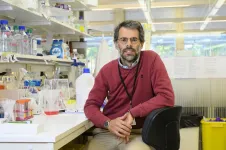Mining precious rare-earth elements from coal fly ash with a reusable ionic liquid
2021-06-23
(Press-News.org) Rare-earth elements are in many everyday products, such as smart phones, LED lights and batteries. However, only a few locations have large enough deposits worth mining, resulting in global supply chain tensions. So, there's a push toward recycling them from non-traditional sources, such as waste from burning coal -- fly ash. Now, researchers in ACS' Environmental Science & Technology report a simple method for recovering these elements from coal fly ash using an ionic liquid.
While rare-earth elements aren't as scarce as their name implies, major reserves are either in politically sensitive locations, or they are widely dispersed, which makes mining them challenging. So, to ensure their supply, some people have turned to processing other enriched resources. For instance, the ash byproduct from coal-fired power plants has similar elemental concentrations to raw ores. Yet, current methods to extract these precious materials from coal fly ash are hazardous and require several purification steps to get a usable product. A potential solution could be ionic liquids, which are considered to be environmentally benign and are reusable. One in particular, betainium bis(trifluoromethylsulfonyl)imide or [Hbet][Tf2N], selectively dissolves rare-earth oxides over other metal oxides. This ionic liquid also uniquely dissolves into water when heated and then separates into two phases when cooled. So, Ching-Hua Huang, Laura Stoy and colleagues at Georgia Tech wanted to see if it would efficiently and preferentially pull the desired elements out of coal fly ash and whether it could be effectively cleaned, creating a process that is safe and generates little waste.
The researchers pretreated coal fly with an alkaline solution and dried it. Then, they heated ash suspended in water with [Hbet][Tf2N], creating a single phase. When cooled, the solutions separated. The ionic liquid extracted more than 77% of the rare-earth elements from fresh material, and it extracted an even higher percentage (97%) from weathered ash that had spent years in a storage pond. Finally, rare-earth elements were stripped from the ionic liquid with dilute acid. The researchers found that adding betaine during the leaching step increased the amounts of rare-earth elements extracted. The team tested the ionic liquid's reusability by rinsing it with cold water to remove excess acid, finding no change in its extraction efficiency through three leaching-cleaning cycles. The researchers say that this low-waste approach produces a solution rich in rare-earth elements, with limited impurities, and could be used to recycle precious materials from the abundance of coal fly ash held in storage ponds.
INFORMATION:
The authors acknowledge funding from the National Science Foundation Graduate Research Fellowship, the Georgia Power Fellowship hosted by the Georgia Institute of Technology and the Environmental Research & Education Foundation.
The paper's abstract will be available on June 23 at 8 a.m. Eastern time here: http://pubs.acs.org/doi/abs/10.1021/acs.est.1c00630
The American Chemical Society (ACS) is a nonprofit organization chartered by the U.S. Congress. ACS' mission is to advance the broader chemistry enterprise and its practitioners for the benefit of Earth and all its people. The Society is a global leader in promoting excellence in science education and providing access to chemistry-related information and research through its multiple research solutions, peer-reviewed journals, scientific conferences, eBooks and weekly news periodical Chemical & Engineering News. ACS journals are among the most cited, most trusted and most read within the scientific literature; however, ACS itself does not conduct chemical research. As a leader in scientific information solutions, its CAS division partners with global innovators to accelerate breakthroughs by curating, connecting and analyzing the world's scientific knowledge. ACS' main offices are in Washington, D.C., and Columbus, Ohio.
To automatically receive news releases from the American Chemical Society, contact newsroom@acs.org.
Follow us: Twitter | Facebook
ELSE PRESS RELEASES FROM THIS DATE:
2021-06-23
A new United Nations report calls for an urgent change in the way the world's oceans are managed.
The report from the International Resource Panel, hosted by the UN Environment Programme, raises concerns that if changes are not made quickly, the consequences will be dire.
The Governing Coastal Resources Report was launched today at an event addressed by Ambassador Peter Thomson, UN Secretary-General's Special Envoy for the Ocean. It outlines the effect land-based human activities have on the marine environment.
Put into context - 80 per cent of marine and coastal pollution originates on land, but there are very few, if any, truly effective governance mechanisms that manage land-ocean ...
2021-06-23
Using data for more than 500 young stars observed with the Atacama Large Millimeter/Submillimeter Array (ALMA), scientists have uncovered a direct link between protoplanetary disk structures--the planet-forming disks that surround stars--and planet demographics. The survey proves that higher mass stars are more likely to be surrounded by disks with "gaps" in them and that these gaps directly correlate to the high occurrence of observed giant exoplanets around such stars. These results provide scientists with a window back through time, allowing them to predict what exoplanetary ...
2021-06-23
COLUMBUS, Ohio - Americans consistently believe that poor African Americans are more likely to move up the economic ladder than they actually are, a new study shows.
People also overestimate how likely poor white people are to get ahead economically, but to a much lesser extent than they do for Black people.
"It's no surprise that most people in our society believe in the American Dream of working hard and succeeding economically," said Jesse Walker, co-author of the study and assistant professor of marketing at The Ohio State University's Fisher College of Business.
"But many people don't know how much harder it is for African Americans to achieve ...
2021-06-23
As people go about their daily activities, complex fluctuations in their movement occur without conscious thought. These fluctuations -- known as fractal motor activity regulation (FMAR) -- and their changes are not readily detectable to the naked eye, but FMAR patterns can be recorded using a wristwatch-like device known as an actigraph. A new study, led by investigators at Brigham and Women's Hospital, the Massachusetts General Hospital (MGH) and Washington University at St. Louis, analyzed FMAR patterns in cognitively healthy adults who were also tested for established biomarkers of preclinical Alzheimer's disease (AD) pathology. The team found that FMAR was associated with preclinical AD pathology in women, suggesting that FMAR may be a new biomarker for AD before cognitive symptoms ...
2021-06-23
BOSTON - Research has previously linked inflammation to Alzheimer's disease (AD), yet scientists from Massachusetts General Hospital (MGH) and the Harvard Aging Brain Study (HABS) have made a surprising discovery about that relationship. In a new study published in Alzheimer's & Dementia: The Journal of the Alzheimer's Association, they report that elevated levels of two chemical mediators of inflammation, known as cytokines, are associated with slower cognitive decline in aging adults.
"These are totally unexpected results," says the study's co-senior author, Rudolph Tanzi, PhD, vice chair of Neurology and co-director ...
2021-06-23
DALLAS, June 23, 2021 —Can starchy snacks harm heart health? New research published today in the Journal of the American Heart Association, an open access journal of the American Heart Association, found eating starchy snacks high in white potato or other starches after any meal was associated at least a 50% increased risk of mortality and a 44-57% increased risk of CVD-related death. Conversely, eating fruits, vegetables or dairy at specific meals is associated with a reduced risk of death from cardiovascular disease, cancer or any cause.
“People are increasingly ...
2021-06-23
A fair society has evolved in banded mongooses because parents don't know which pups are their own, new research shows.
Mothers in banded mongoose groups all give birth on the same night, creating a "veil of ignorance" over parentage in their communal crèche of pups.
In the new study, led by the universities of Exeter and Roehampton, half of the pregnant mothers in wild mongoose groups were regularly given extra food, leading to increased inequality in the birth weight of pups.
But after giving birth, well-fed mothers gave extra care to the ...
2021-06-23
Results of the MOSAiC expedition show: the expected recovery of the ozone layer may fail to happen anytime soon, if global warming is not slowed down
In spring 2020, the MOSAiC expedition documented an unparalleled loss of ozone in the Arctic stratosphere. As an evaluation of meteorological data and model-based simulations by the Alfred Wegener Institute, Helmholtz Centre for Polar and Marine Research (AWI) now indicates, ozone depletion in the Arctic polar vortex could intensify by the end of the century unless global greenhouse gases are rapidly and systematically reduced. In the future, this could also mean more UV radiation exposure in Europe, North America and Asia when parts ...
2021-06-23
Researchers at Karolinska Institutet in Sweden have developed a technology for cost-effective surveillance of the global spread of new SARS-CoV-2 variants. The technique is presented in the scientific journal Nature Communications.
Since the onset of the pandemic, thousands of viral genomes have been sequenced to reconstruct the evolution and global spread of the coronavirus. This is important for the identification of particularly concerning variants that are more contagious, pathogenic, or resistant to the existing vaccines.
For global surveillance of the SARS-CoV-2 genome, it is crucial to sequence and analyse many samples in a cost-effective way. Therefore, researchers in the Bienko-Crosetto laboratory at Karolinska Institutet and Science for Life Laboratory (SciLifeLab) ...
2021-06-23
The origins of seven types of kidney cancer, including several rare subtypes, have been identified by researchers at the Wellcome Sanger Institute, Great Ormond Street Hospital (GOSH), the Princess Máxima Center for Pediatric Oncology and Oncode Institute. The findings confirm that these cancers have their origin in specific forms of developmental cells present in the maturing fetus.
The study, published today (23 June) in Nature Communications, used computational methods to analyse existing datasets and pinpoint the 'cellular signals' given off by different cancers as they emerge. This method holds promise as a tool for diagnosing patients with rare cancers - in the study, one patient's cryptic kidney cancer was identified as ...
LAST 30 PRESS RELEASES:
[Press-News.org] Mining precious rare-earth elements from coal fly ash with a reusable ionic liquid

